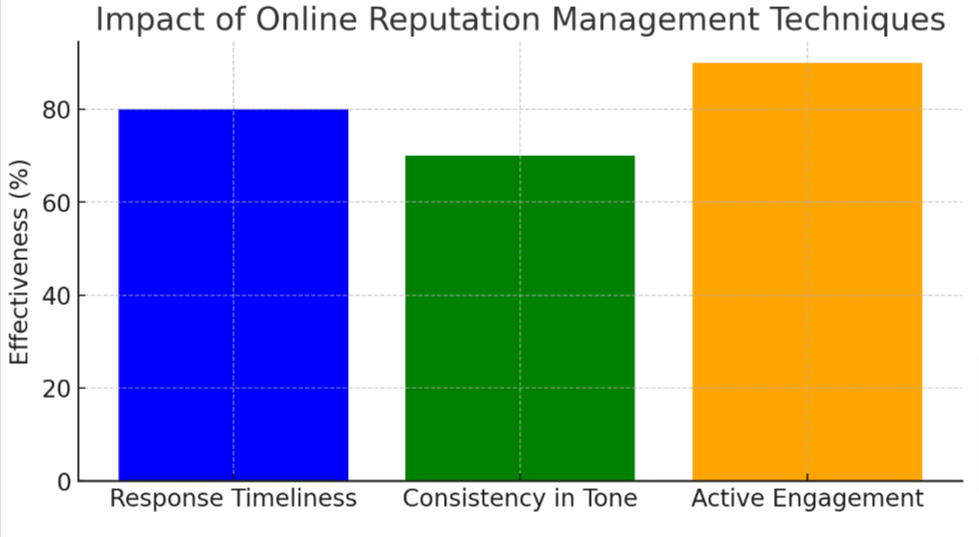Essential Online Reputation Management for Review Writers
As a review writer, your online reputation can make or break your success. A single bad review can tarnish an image you’ve worked hard to build. This article is your guide to managing that reputation with precision and care.
Keep reading; let’s protect your credibility together!
Key Takeaways
- Review writers must respond to both positive and negative feedback quickly and professionally, as their reactions can significantly influence customer trust and online reputation.
- Online reviews are a major factor in consumer buying decisions; managing them effectively requires regular monitoring, engagement, and the use of specialized review management tools.
- Establishing a consistent voice across all review platforms reinforces credibility; promoting positive reviews and addressing complaints shows commitment to customer satisfaction.
- Setting SMART goals for online reputation management helps review writers stay focused on measurable improvements and accountability in their digital presence.
- Implementing a standard process for handling feedback, including training team members on best practices, is essential for maintaining an effective approach to online reputation management.
Why Online Reputation Matters for Review Writers
Your online reputation as a review writer impacts trust, credibility, and customer engagement. It also provides valuable insights and an opportunity to resolve customer grievances effectively.
Impact on trust and credibility
Review writers hold the key to influencing public perception. Their words shape how potential customers view products and services. Accurate and honest reviews build a solid foundation of trust with readers, establishing review writers as reliable sources of information.
This credibility can make or break a brand’s reputation, as consumers often decide whether to engage with a business based on what they read online.
A strong reputation management strategy emphasizes maintaining integrity in every piece of feedback shared. To keep trust high, it’s crucial for review writers to stay consistent in their assessments and transparent when addressing negative aspects.
Positive customer experiences reflected through sincere testimonials enhance the social footprint of both reviewers and businesses alike. As such, crafting an online presence that resonates truthfulness will ensure the longevity and authority of any reviewer’s digital reputation management efforts.
Insights gained
Gathering insights is essential for effective online reputation management. Review writers learn a lot from monitoring feedback across various platforms. They see what aspects of their work resonate with audiences and which areas might need improvement.
This continuous loop of customer feedback analysis becomes a powerful tool for enhancing one’s digital reputation management tactics.
By tapping into this wealth of information, review writers can tailor their strategies to better meet the needs and expectations of their readership. The result is often a more finely tuned online presence that reflects the strengths they bring to the table while addressing any weaknesses head-on.
Next, we’ll explore how increased engagement with positive reviews can further boost your brand’s online visibility and credibility.
Increased engagement with positive reviews
Having a clear understanding from the insights gained, positive reviews drive more interactions. As review writers capture favorable feedback, their social footprint expands, drawing in curious new readers and potential customers.
Positive testimonials act like magnets on social media platforms and review management platforms, often resulting in higher engagement rates. They spark conversations and sharing which can amplify your online visibility.
Actively managing these glowing recommendations enhances your brand reputation further. Engaged customers tend to stay loyal and spread the word about their great experiences with others.
This is where responding promptly to these positive remarks becomes crucial – it shows you value customer opinions and builds a strong relationship with your audience. By fostering this positive loop of feedback and engagement, you cement your standing as a trustworthy source for information or services within your niche.
Customer grievance resolution
Resolving customer grievances is crucial for maintaining a positive online reputation. Addressing complaints promptly and professionally can turn dissatisfied customers into loyal advocates.
By acknowledging their concerns and offering solutions, businesses demonstrate their commitment to customer satisfaction. Timely resolution of issues also showcases transparency and accountability, contributing to a trustworthy brand image.
Utilizing feedback analysis tools can help identify recurring problems and areas for improvement, enabling review writers to proactively address customer grievances. Encouraging open communication channels allows businesses to resolve issues before they escalate, fostering stronger relationships with customers while enhancing their online reputation.
Developing a Successful Online Review Management Strategy
Identifying review networks to monitor, responding to reviews (positive and negative), utilizing the right online review management tools, and promoting reviews are crucial for building a strong online reputation as a review writer.
Ready to learn more about maximizing your online presence? Keep reading!
Identifying review networks to monitor
To identify review networks to monitor, start by conducting research on popular platforms such as Google My Business, Yelp, TripAdvisor, and industry-specific websites. Look for platforms where your target audience is likely to share their reviews and experiences. Check social media channels like Facebook, Twitter, and Instagram for customer feedback and testimonials.
Explore niche forums and discussion groups related to your industry to uncover valuable insights from engaged customers. Don’t overlook the significance of monitoring feedback on e-commerce websites if you offer products online. Additionally, consider using online review management tools with features tailored to track reviews across various platforms seamlessly.
Regularly analyze customer experiences shared across these networks to gain a comprehensive understanding of your brand’s reputation.
Responding to reviews (positive and negative)
When responding to reviews, use a personalized approach to acknowledge and thank customers for their feedback. Address any concerns or issues raised in negative reviews promptly and professionally. Utilize customer feedback to make improvements and show authenticity in your responses.
Encourage dialogue by inviting customers to connect directly with you if they have further concerns or questions. Always maintain a positive and respectful tone, regardless of the nature of the review.
Actively monitor and respond to reviews across various platforms to demonstrate your commitment to customer satisfaction. Emphasize the importance of positive reviews by expressing gratitude and reinforcing the value they bring to your business.
Utilizing the right online review management tools
Utilizing the right online review management tools is crucial for effectively managing your online reputation. Here are some key tools and their benefits:
- Social media monitoring: Helps track conversations about your brand across various social platforms, allowing you to respond promptly to any feedback.
- Review management platform: Offers a centralized hub to monitor and respond to reviews from multiple sources, streamlining the process.
- Reputation monitoring tools: Provide insights into customer sentiment, allowing you to identify trends and areas for improvement.
- Customer feedback analysis: Enables you to gather, analyze, and act upon customer feedback, enhancing your overall reputation.
- Online presence management: Allows you to maintain a consistent and positive digital footprint across various online channels.
- Brand reputation software: Assists in tracking brand mentions, maintaining a positive brand image, and addressing any negative publicity effectively.
- Digital reputation management: Provides comprehensive tools for monitoring, analyzing, and improving your digital presence and reputation.
Promoting reviews
After utilizing the right online review management tools, promoting reviews is essential for boosting your online reputation. Encourage satisfied customers to share their experiences on popular review platforms and social media channels using engaging and personalized calls-to-action.
Highlight positive feedback on your website and other marketing materials to showcase your brand’s credibility and customer satisfaction. Actively responding to reviews and expressing gratitude for positive feedback can encourage more customers to leave reviews, further enhancing your online reputation.
Encourage satisfied customers to share their experiences on popular review platforms and social media channels using engaging and personalized calls-to-action. Responding promptly to positive reviews not only shows appreciation but also encourages more customers to leave feedback.
Best Practices for Managing Online Reputation
Identify your strengths and weaknesses to develop a targeted strategy for review management. Find your voice and create engaging content that resonates with your audience, while maintaining consistency across all platforms.
Set SMART goals to guide your reputation management efforts and own your name in the digital space.
Setting SMART goals
To effectively manage online reputation, review writers should set SMART goals:
- Define Specific goals that are clear and well – defined.
- Ensure that the goals are Measurable to track progress and success.
- Select Attainable goals that are realistic and achievable within the resources available.
- Ensure that the goals are Relevant to the overall review management strategy and align with the brand’s objectives.
- Set Time – bound goals with specific deadlines for achievement to maintain focus and accountability.
Identifying strengths and weaknesses
When identifying strengths and weaknesses in your online reputation, it’s essential to analyze customer feedback across various review networks. Take note of positive reviews highlighting your exceptional customer service or product quality.
Use this insight to amplify these strengths through targeted promotional efforts. Additionally, recognizing any weaknesses revealed in negative reviews can drive improvement initiatives, thereby enhancing brand reputation.
To strengthen your digital presence, continually monitor and evaluate customer sentiment across different platforms such as social media and review websites. Furthermore, regularly assess your response strategy by gauging how effectively you address both praise and criticism.
Finding your voice and creating engaging content
Crafting engaging content is crucial for review writers to capture and retain their audience’s attention. Utilize a conversational tone that resonates with your target audience, ensuring that your message is relatable and easy to understand.
Incorporate storytelling elements into your reviews to provide a compelling narrative that keeps readers engaged while also infusing personality into your content.
Incorporate visual elements such as images, infographics, or videos to enhance the overall appeal of your reviews and make them more visually stimulating. Additionally, focus on delivering valuable insights and information that are relevant and useful to your readers, thereby establishing yourself as an authoritative voice within the industry.
Owning your name and maintaining consistency
Establishing a distinctive online presence by consistently using your name across all platforms helps build recognition and trust. Keeping a uniform identity strengthens your brand image, making it easier for customers to find and engage with you.
Maintaining consistency in the tone and messaging of your reviews contributes to creating a reliable impression that resonates with your audience, thereby bolstering credibility.
Crafting engaging content that aligns with your brand’s values reinforces the positive impact on customer perception, showcasing authenticity and reliability. Embracing this approach ultimately fosters a strong digital reputation that instills confidence in potential customers, encouraging increased interaction and loyalty to your brand.
Mastering Review Management: Tips for Success
Understanding the role of online reviews in buying decisions and crafting an effective review management strategy are key to success. Utilizing review management software, implementing a standard review management process, and following the do’s and don’ts will help you master the art of managing online reputation as a review writer.

Understanding the role of online reviews in buying decisions
Online reviews play a pivotal role in influencing buying decisions. Potential customers often rely on the opinions and experiences shared by others to make informed purchasing choices.
Positive online reviews can build trust and credibility for a brand, ultimately impacting the decision-making process of consumers. Conversely, negative reviews can deter potential buyers from engaging with a product or service.
Customer feedback analysis is crucial in understanding how online reviews directly impact consumer behavior. By recognizing the significance of online reviews in shaping buying decisions, review writers can effectively tailor their content to resonate with their target audience’s needs and preferences.
Crafting an effective review management strategy
Craft a solid review management strategy to proactively engage with customer feedback. Identify key review platforms, such as Yelp, Google My Business, and industry-specific sites, for monitoring.
Regularly respond to both positive and negative reviews to demonstrate attentiveness and willingness to address concerns. Utilize online review management tools like ReviewTrackers or Birdeye for efficient tracking and comprehensive analysis of customer feedback.
Actively promote positive reviews across your digital footprint to bolster brand reputation.
Implementing an effective review management strategy not only strengthens your online presence but also enhances customer trust in your brand. Be proactive in managing customer reviews by promptly responding to comments on various platforms, utilizing the right tools for streamlined processes, and actively promoting positive testimonials.
Utilizing review management software
To effectively manage online reviews, review writers can leverage review management software. This powerful tool enables them to monitor and respond to reviews across various platforms, allowing for timely and efficient engagement with customers.
By utilizing review management software, writers can gain valuable insights into customer feedback and sentiment, identify trends in their reviews, and take proactive measures to address any negative feedback promptly.
Additionally, this software simplifies the process of promoting positive reviews by sharing them on social media or other channels. Overall, the use of review management software streamlines the entire review management process and helps writers maintain a positive online reputation.
Implementing a standard review management process
Implementing a standard review management process is crucial for maintaining online reputation. Here are some key steps to follow:
- Regularly monitor review platforms and social media channels for new feedback to stay updated on customer sentiments and address any concerns promptly.
- Develop clear guidelines for responding to reviews, ensuring that all interactions are professional, empathetic, and aimed at resolving issues or acknowledging positive feedback.
- Establish a consistent timeline for reviewing and addressing feedback to maintain an active and responsive online presence.
- Utilize review management software to streamline the process, centralize feedback, and efficiently track responses across multiple platforms.
- Train team members involved in managing reviews to ensure that they understand the importance of consistency, professionalism, and timely engagement with customers.
Do’s and don’ts of review management
Do’s and Don’ts of Review Management:
- Do respond promptly to all reviews, showing appreciation for positive feedback and addressing concerns in negative reviews with professionalism and empathy.
- Do monitor multiple review platforms to ensure comprehensive engagement with customers and gain valuable insights into their experiences and expectations.
- Don’t ignore negative reviews, but instead use them as an opportunity to improve your products, services, and customer experience.
- Don’t use generic responses when addressing customer reviews; personalize your interactions to show genuine care for each customer’s feedback.
- Do encourage satisfied customers to leave reviews by making the process simple and convenient, leveraging their positive experiences to enhance your brand reputation.
- Don’t engage in arguments or heated exchanges with dissatisfied customers online; maintain a calm and constructive tone throughout all interactions.
Conclusion
In conclusion, managing online reputation for review writers is vital for building trust and credibility. Responding to reviews promptly and utilizing the right tools are essential strategies.
Understanding the impact of online reviews on buying decisions is crucial for success in reputation management. Craft an effective review management strategy while leveraging review management software can help optimize customer experiences.
Embracing best practices and mastering review management will lead to a positive brand image and increased customer engagement.

